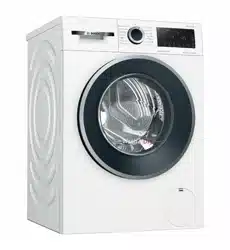Documents: Go to download!
User Manual
- User Manual - (English)
- Specifications Sheet - (English)
- Spec Sheet (web) - (English)
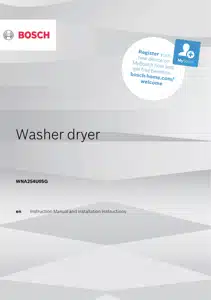
- Getting to know the appliance
- Laundry
- Detergent
- Overview of programmes
- Programme default settings
- Operating the appliance
- Appliance settings
- Cleaning and maintenance
- Faults and what to do about them
Table of contents
User Manual for Washer Dryer Combo
Getting to know the appliance
Appliance
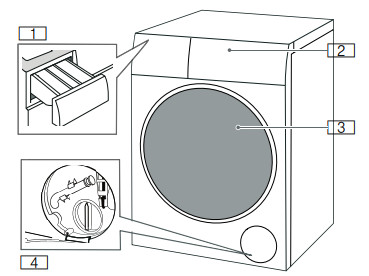
 Detergent drawer
Detergent drawer
 Control panel
Control panel
 Loading door
Loading door
 Service flap
Service flap
Control panel
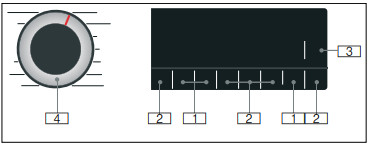
 Programme default settings can be changed. Overview of all programme default settings
Programme default settings can be changed. Overview of all programme default settings  Page 33
Page 33
 Additional programme settings can be selected. Overview of all additional programme settings
Additional programme settings can be selected. Overview of all additional programme settings  Page 34
Page 34

 Start/Reload button for starting, interrupting, (e.g. adding laundry) and cancelling a programme.
Start/Reload button for starting, interrupting, (e.g. adding laundry) and cancelling a programme.
 Programme selector for selecting the programme and for switching the appliance on and off.
Programme selector for selecting the programme and for switching the appliance on and off.
Display panel
Programme default settings

* Depending on the selected model and programme.
Additional programme settings

Status indicators for the programme progress (programme sequence)

 Laundry
Laundry
Preparing laundry for washing
Protecting your laundry and appliance
Caution!
Damage to the appliance/textiles
Foreign objects (e.g. coins, paper clips, needles, nails) may damage the washing or components of the appliance.
The following instructions must be observed when preparing your laundry:
■ Always follow the manufacturer's instructions when dosing all detergents, cleaning aids, care products and cleaning agents.
■ Do not exceed maximum load. Overfilling will impair the washing result.
■ Keep detergents and agents for the pretreatment of laundry (e.g. stain remover, prewash sprays, etc.) away from the surfaces of the appliance. Using a damp cloth, immediately remove any fine spray residue and other residue or droplets.
■ Empty any pockets. Remove any foreign objects.
■ Remove metal parts (paper clips, etc.).
■ Trousers, knitwear and knitted textiles, e.g. jersey garments, T-shirts or sweatshirts, should be turned inside out.
■ Ensure that underwired bras are appliance-washable.
■ Wash delicates in a net or bag (tights, underwired bras, etc).
■ Close zips, button up covers.
■ Brush sand out of pockets and collars.
■ Remove curtain fittings or place in a net/bag.
Sorting laundry
Sort your laundry according to the care instructions and manufacturer's information on the care labels, depending on:
■ Type of fabric/fibre
■ Colour
Note: Laundry may discolour. Wash white and coloured items separately. Wash new coloured items separately the first time you wash them.
■ Soiling Wash laundry with the same level of soiling together.
– Light: No need to pretreat, adjust the  SpeedPerfect setting if necessary.
SpeedPerfect setting if necessary.
– Normal
– Heavy: Load less laundry, need to pretreat or soak laundry firstly.
– Stains: Remove/pretreat stains while they are fresh. First dab with soapy water; do not rub. Then wash the items of laundry with the appropriate programme. Stubborn or dried-in stains can sometimes only be removed by washing several times.
■ Symbols on the care labels
 Suitable for normal washing process;e.g. Cottons
Suitable for normal washing process;e.g. Cottons  programme
programme
 A gentle washing process is required; e.g. Synthetics
A gentle washing process is required; e.g. Synthetics  programme
programme
 An especially gentle washing process is required; e.g. Delicates/Silk
An especially gentle washing process is required; e.g. Delicates/Silk  programme
programme
 Suitable for washing by hand; e.g.
Suitable for washing by hand; e.g.  Wool
Wool  programme
programme
 Do not machine wash.
Do not machine wash.
Preparing laundry for drying
Note: To ensure an even drying result, sort the laundry according to the:
■ Type of fabric
■ Care symbols which are indicated on the care labels
Only dry laundry which is labelled “dryer-proof” or which has the following care symbols:
■  : You can select Cottons
: You can select Cottons  /Cottons Eco
/Cottons Eco Wash & Dry 60'/Rinse
Wash & Dry 60'/Rinse Spin/
Spin/ My Time +
My Time +  Dry
Dry
■  : You can select Daily Wash
: You can select Daily Wash  /Synthetics
/Synthetics  Wool
Wool Down Wear/
Down Wear/ Hygiene Care +
Hygiene Care +  Dry
Dry
The following textiles must not be dried:
■ = care symbol “Do not dry”
= care symbol “Do not dry”
■ Delicates (silk, synthetic curtains).
■ Textiles which contain foam rubber or similar materials.
■ Textiles which were treated with flammable liquids, e.g. with stain remover, petroleum ether, thinners. Risk of explosion!
■ Textiles which still contain hairspray or similar substances.
Notes
■ Before drying, hand-washed textiles must be spun at the appropriate spin speed.
■ Before drying, spin at the optimum speed. A spin speed of more than 1000 rpm is recommended for cotton, more than 800 rpm for easycare textiles.
■ Do not iron washing immediately after drying. It is recommended to roll the washing up first to distribute residual moisture evenly.
■ To ensure a good drying performance, quilts, terry cloths and other large textiles should be dried separately.
■ Do not exceed the maximum load.
Starching
Note: Laundry should not be treated with fabric softener.
1. Switch on the appliance.
2. Select the Rinse  programme.
programme.
3. Measure starch into dispenser in accordance with the manufacturer's instructions (clean first if necessary).
in accordance with the manufacturer's instructions (clean first if necessary).
4. Touch the  Start/Reload button.
Start/Reload button.
Dyeing/bleaching
Dye should only be used in normal household quantities. Salt may damage stainless steel. Always follow the dye manufacturer's instructions.
Do not use the appliance to bleach clothes.
Detergent
Correct selection of detergent
The care label is crucial to ensure correct detergent selection, temperature and laundry treatment.
■ Standard detergent with optical brighteners suitable for heat-resistant white washing made from linen or cotton Programme: Cottons  / cold – max. 90 °C
/ cold – max. 90 °C
■ Detergent for colours without bleach or optical brighteners suitable for coloured washing made from linen or cotton Programme: Cottons  / cold – max. 60 °C
/ cold – max. 60 °C
■ Detergent for colours/delicates without optical brighteners suitable for coloured laundry made from easy-care fibres, synthetic fibres Programme: Synthetics  / cold – max. 60 °C
/ cold – max. 60 °C
■ Detergent for delicates suitable for delicate, fine fabrics, silk or viscose Programme: Delicates/Silk  / cold – max. 40 °C
/ cold – max. 40 °C
■ Detergent for woollens suitable for woollen fabrics Programme:  Wool
Wool  / cold – max. 40 °C
/ cold – max. 40 °C
Saving energy and detergent
For light and normal soiling, you can save energy (lower washing temperature) and detergent.
|
Saving Reduced temperature and detergent quantity as per the recommended dosage
Temperature as per the care label and detergent quantity as per the recommended dosage for heavy soiling |
Soiling/note Light No visible dirt or stains. Clothing has taken on some body odour, e.g.: ■ Light summer/sports clothing (worn for a few hours) ■ T-shirts, shirts, blouses (worn for up to one day) ■ Guest bed linen and hand towels (used for one day) Normal Visible dirt or a few light stains, e.g.: ■ T-shirts, shirts, blouses (sweat soaked, worn a few times) ■ Towels, bedding (used for up to one week) Heavy Dirt and/or stains clearly visible, e.g. tea towels, baby items, work clothing |
Note: When measuring the amount of all detergents/additives/care products and cleaning agents, please always check the manufacturer's instructions and information.
Overview of programmes
Selectable programme
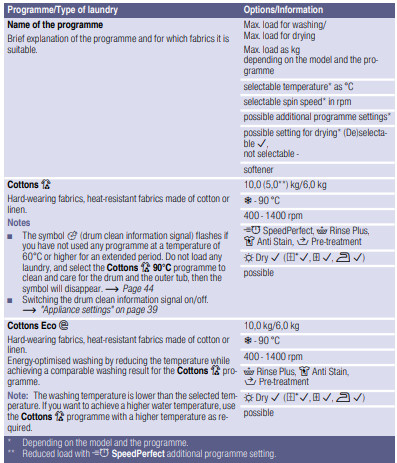
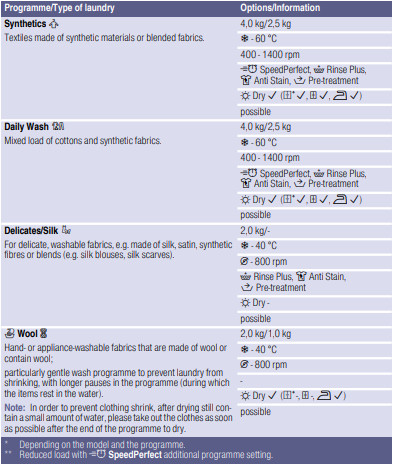
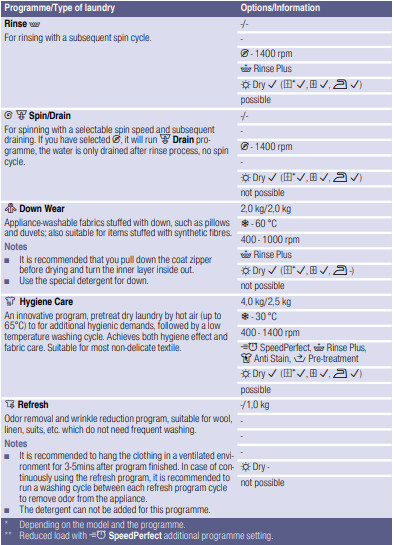
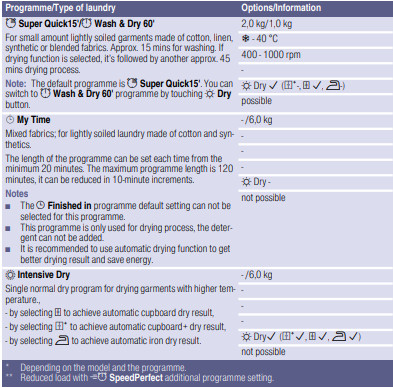
Drying table
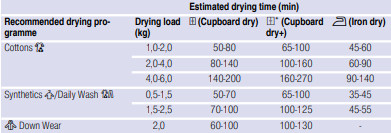
- Drying time table is only for reference. For wash + dry program, washing duration shall be added for total program time.
- The time listed above is the reference value, the actual drying effect may be affected by the clothing type, clothing weight, dehydration degree and ambient temperature.
- In order to achieve uniform drying effect, it is recommended to distinguish between heavy and lightweight clothing. For example, separate the thick towel and the shirt to bake.
- Cupboard dry+) is recommended for drying bulky or heavy clothing.
- In order to reduce the folding of clothing after drying, it is recommended to put a small amount of clothing drying.
- Please refer to the panel display for the drying time of the programme not mentioned in the table above.
Programme default settings
You can change the default settings for selected programmes. The settings can be changed even while the selected programme is running. The effects depending on the progress of the programme.
 Temp.°C
Temp.°C
Before and after the programme starts, you can change the temperature setting, depending on what stage the programme is in, by adjusting the desired temperature on the display.
The maximum temperature that can be set depends on the programme that has been selected.
 rpm
rpm
Depending on what stage the programme is in, you can change the spin speed (in rpm; revolutions per minute) before and during the programme by adjusting the desired speed on the display
setting  :
: =”No spin”. The rinsing water is drained but there is no final spin. The laundry stays wet inside the drum, e.g. for items that should not be spun.
=”No spin”. The rinsing water is drained but there is no final spin. The laundry stays wet inside the drum, e.g. for items that should not be spun.
You can select “No spin” to prevent creasing if the laundry will not be taken out of the appliance immediately after the programme has ended.
The maximum speed that can be set depending on the model and the programme that has been selected.
 Finished in
Finished in
Before starting the programme, you can preselect the programme end ("Finish in" time) in 0.5h (h = hour) increments (between “minimum selectable ending time” and 9.5h) or 1 hour increments (between 10h and 24h) up to a maximum of 24 hours.
To do this:
- 1. Select a programme (except
 My Time* programme). The programme duration is displayed for the selected programme, e.g. 2:30 (hours:minutes).
My Time* programme). The programme duration is displayed for the selected programme, e.g. 2:30 (hours:minutes). - 2. Select the
 Finished in button repeatedly until the required number of hours is displayed.
Finished in button repeatedly until the required number of hours is displayed. - 3. Select the
 Start/Reload button. The programme starts. The selected number of hours (e.g. 8h) is shown in the display panel and counts down until the programme starts. The duration of the programme is then displayed.
Start/Reload button. The programme starts. The selected number of hours (e.g. 8h) is shown in the display panel and counts down until the programme starts. The duration of the programme is then displayed.
Note: The length of the programme is automatically adjusted when the programme is running. Changes to the programme default settings or additional programme settings may also change the programme duration.
After starting the programme (if a “Finish in” time has been selected and the programme has not yet started), you can change the preselected number of hours as follows:
- 1. Select the
 Start/Reload button.
Start/Reload button. - 2. Select the
 Finished in button repeatedly to change the number of hours.
Finished in button repeatedly to change the number of hours. - 3. Select the
 Start/Reload button.
Start/Reload button.
 Operating the appliance
Operating the appliance
Preparing the appliance
The appliance was tested before delivery. To remove residual water from the test procedure, the first wash cycle should be run without laundry using the Cottons  90°C programme.
90°C programme.
 "Before washing for the first time" on page 20
"Before washing for the first time" on page 20
Notes
■ Never switch on a damaged appliance!
■ Inform customer service!
1. Insert mains plug.
Warning Risk of death from electric shock! Risk of death if live parts are touched.
– Never pull out the mains plug by tugging the power cord.
– Insert/pull out the mains plug with dry hands only.
2. Turn the water tap on.
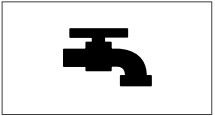
3. Open the appliance door
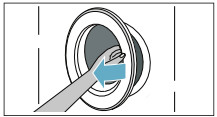
Note: If you have activated the childproof lock, you must first deactivate it before you can set a programme.
Use the programme selector to select the required programme. The programme selector can be rotated in either direction. The appliance is switched on.
The programme default settings for the selected programme alternately appear in the display panel:
■ The maximum load and
■ the duration of the programme and
■ ...
Placing laundry into the drum
Open the door, place laundry in the drum, make sure that no items of laundry are trapped between the door and the rubber seal, and close the door
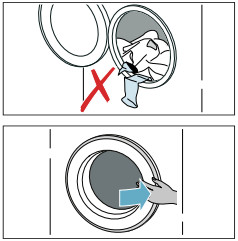
Notes
■ Unfold and load presorted items of laundry. Mix large and small items. Washing items of different size distribute themselves better during the spin cycle. Individual items of washing may cause an unbalanced load.
■ Observe the maximum specified load. Overfilling adversely affects the washing/drying result and promotes creasing.
Dosing and adding detergent and care products
Caution! Damage to the appliance Detergents and agents for the pretreatment of laundry (e.g. stain remover, prewash sprays, etc.) may damage the surfaces of the appliance. Keep these agents away from the surfaces of the appliance. Using a damp cloth, immediately remove any fine spray residue and other residue/ droplets.
Dosing
Dose the detergents and care products according to:
■ water hardness (ask your water supply company),
■ the manufacturer’s specifications on the packaging,
■ the amount of laundry,
■ soiling.
Filling the dispensers
1. Pull out the detergent drawer.
:Warning Eye / skin irritation! If the detergent drawer is opened while the appliance is running, detergent/care product may run out. Carefully open the drawer. If detergent/care product comes into contact with eyes or skin, rinse thoroughly. If accidentally swallowed, seek medical advice.
2. Pour in detergent and/or cleaning product.
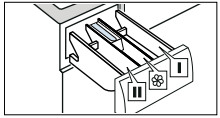
Dispenser I Detergent for pretreat and clothing disinfectant. (only for the appliance with pretreat and disinfectant function)
Dispenser  Softener, starch. Do not exceed the maximum load.
Softener, starch. Do not exceed the maximum load.
Dispenser II Detergent for main wash, water softener, bleach, stain remover.
Notes
■ Always follow the manufacturer's instructions when dosing all detergents, cleaning aids, care products and cleaning agents.
■ Dilute viscous fabric softener and fabric conditioner with water. This will prevent blockages.
■ Be careful when opening the detergent drawer while the appliance is running
Starting the programme
Touch and hold  Start/Reload button for 1~2 seconds, then release the button. The programme starts and the appliance door is locked.
Start/Reload button for 1~2 seconds, then release the button. The programme starts and the appliance door is locked.
The finish-in time is shown in the display panel and counts down until the programme starts. After the programme has started, the programme duration is displayed. And the symbols for the programme progress are lighting up.
Childproof lock
You can lock the appliance to prevent the settings you have set from being changed inadvertently. To do this, activate the childproof lock.
To activate the childproof lock:
After the programme starts, Touch and hold the  Rinse Plus and
Rinse Plus and  Finished in buttons for 3 seconds. The symbol
Finished in buttons for 3 seconds. The symbol  lights up in the display panel.
lights up in the display panel.
■  lights up: The childproof lock is activated.
lights up: The childproof lock is activated.
■  flashes: If the programme and programme settings are adjusted while childproof lock is activated.
flashes: If the programme and programme settings are adjusted while childproof lock is activated.
Note: When the programme ends, End is displayed. The door is unlocked.  symbol remain on to remind you to deactivate the childproof lock.
symbol remain on to remind you to deactivate the childproof lock.
To deactivate the childproof lock:
Touch and hold the  Rinse Plus and
Rinse Plus and  Finished in buttons until the symbol
Finished in buttons until the symbol  disappears.
disappears.
Adding/removing laundry
After starting the programme (only for washing), you can add or remove laundry if necessary.
Touch the  Start/Reload button. The appliance checks whether reloading is possible.
Start/Reload button. The appliance checks whether reloading is possible.
If the following appears on the display panel :
■ The symbol  disappears, reloading is possible.
disappears, reloading is possible.
■ The symbol  lights up, reloading is not possible.
lights up, reloading is not possible.
To continue the programme, touch the  Start/Reload button. The programme continues automatically.
Start/Reload button. The programme continues automatically.
Notes
■ Do not leave the door open for too long when adding laundry as water from the laundry may leak out.
■ For safety reasons, the door remains locked when the water level or temperature is high, or while the drum is turning, and it is not possible to add laundry during this time
Changing the programme
If you have started the wrong programme by mistake, you can change the programme as follows:
- 1. Touch the
 Start/Reload button.
Start/Reload button. - 2. Select another programme.
- 3. And touch the
 Start/Reload button again. The new programme starts from the beginning.
Start/Reload button again. The new programme starts from the beginning.
Note: If drying is activated, after touching the  Start/Reload button, when the Hot is displayed, waiting for the appliance running to cool down the laundry till the Hot disappears, then select another programme.
Start/Reload button, when the Hot is displayed, waiting for the appliance running to cool down the laundry till the Hot disappears, then select another programme.
Cancel the programme
For programmes washing at high temperatures:
- 1. Touch the
 Start/Reload button.
Start/Reload button. - 2. To cool down laundry: Select Rinse
 .
. - 3. Touch the
 Start/Reload button.
Start/Reload button.
For programmes washing at low temperatures:
- 1. Touch the
 Start/Reload button.
Start/Reload button. - 2. Select
 Spin/Drain.
Spin/Drain. - 3. Touch the
 Start/Reload button.
Start/Reload button.
For programmes in drying process:
- 1. Touch the
 Start/Reload button.
Start/Reload button. - 2. If the Hot on the display panel, waiting for the appliance running to cool down the laundry till the Hot disappears.
Programme end
End lights up on the display and - and  displays are off. If you have selected
displays are off. If you have selected  the water is only drained after rinse process, no spin cycle.
the water is only drained after rinse process, no spin cycle.
Notes
■ If Hot flashes in the display before the drying programme ends, the temperature in the drum is high. The programme for cooling the drum runs until the temperature in the drum has dropped.
■ If you do not take laundry out within 15 mins after drying process finished, wrinkle guard process will start to prevent laundry getting wrinkled. The process lasts about 30 minutes. 0:00,  ,
, and
and  will be displayed alternately on the display and
will be displayed alternately on the display and  symbol will be displayed as the status symbol. You can touch any button to terminate this process, then the door will be released and laundry can be taken out.
symbol will be displayed as the status symbol. You can touch any button to terminate this process, then the door will be released and laundry can be taken out.
Removing laundry/switching off the appliance
- 1. Set programme selector to Off.
- 2. Open the door and remove the laundry.
- 3. Turn off the water tap.
Note: Not required for Aqua-Stop models.
Notes
■ Do not leave any items of laundry in the drum. They may shrink in the next wash or discolour another item.
■ Remove any foreign objects from the drum and the rubber seal – risk of rusting.
■ Wipe the rubber seal dry.
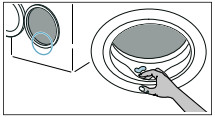
■ Leave the door and detergent drawer open so that any residual water can evaporate.
■ Always wait until the programme ends, as the appliance could still be locked. Then switch the appliance on and wait for it to unlock.
 Appliance settings
Appliance settings
You can change the following settings:
■ The volume of the end signal.
■ The volume of the button signal.
■ Switching the drum care information signal on/off.
You will need to activate the setting mode in order to change these settings
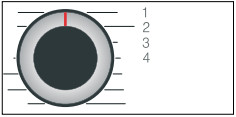
1/2/3/4... positions on the programme selector
 Cleaning and maintenance
Cleaning and maintenance
Warning Risk of death! There is a risk of electric shock if touch live components. Turn the programme selector to Off. Pull out the mains plug.
Caution! Fire and explosion hazard! Toxic vapours can be produced by cleaning agents that contain solvents, e.g. cleaning solvent. Do not use cleaning agents that contain solvents.
Caution! The appliance may be damaged! Cleaning agents that contain solvents, e.g. cleaning solvent, can damage surfaces and components in the appliance. Do not use cleaning agents that contain solvents.
Appliance housing/control panel
■ Remove the detergent residue immediately.
■ Wipe the housing and the control panel with a soft, damp cloth.
■ Do not use abrasive cloths, sponges or detergents (stainless steel cleaner).
■ Do not clean the appliance with a water jet.
Drum
Warning Risk of injury/material damage/ damage to the appliance!
Permanently washing at low temperatures and a lack of ventilation for the appliance may damage the drum and cause injury.
Regularly run a programme for cleaning the drum or wash at temperatures of at least 60ºC.
Leave the appliance to dry after every operation with the door open, and leave the detergent drawer to dry.
Use chlorine-free cleaning agents, do not use steel wool.
If there are odours in the appliance, or to clean the drum, run the Cottons  90°C programme without laundry.
90°C programme without laundry.
Descaling
Descaling should not be necessary if the detergent is measured out correctly. However, if it is required, follow the manufacturer's instructions for the descaling agent. Suitable descalers can be obtained via our website or from customer services
Emptying the detergent draw, cleaning the detergent drawer and its housing
If the appliance contains detergent or fabric softener residues:
1. Pull out the detergent drawer. Press down the insert and fully remove the drawer.
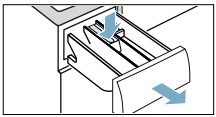
2. To remove the insert: Push the insert upwards from below with your finger.
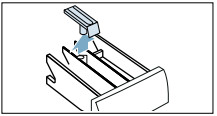
3. Clean the detergent dispenser tray and insert with water and a brush, and dry it. Clean the inside of the housing as well.
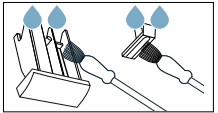
4. Fit the insert and lock it in place (push the cylinder onto the guide pin).
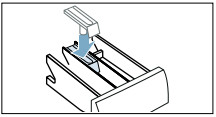
5. Push in the detergent drawer.
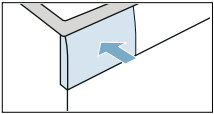
Note: Leave the detergent drawer open so that any residual water can evaporate.
Drain pump is blocked
Note: Turn the water tap off to prevent more water from flowing in and to ensure that it is drained via the pump
Warning Risk of scalding! When you wash at high temperatures, the water gets very hot. If you come into contact with the hot water, you may be scalded.
Allow the water to cool down first.
- 1. Turn the programme selector to Off. Pull out the mains plug.
- 2. Open the service flap.
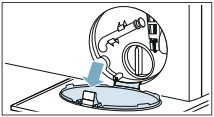
- 3. Take the drain hose out of the retainer. Remove the sealing cap and pour the water out into a suitable container. Replace the sealing cap and place the drain hose back in the retainer.
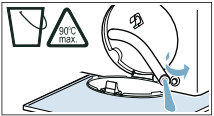
- 4. Carefully unscrew the pump cover; residual water may leak out. Clean the interior, pump cover thread and pump housing. The impeller in the drain pump must be able to rotate.
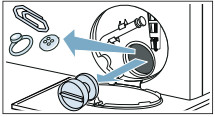
- 5. Refit and screw on the pump cover. The handle must be in a vertical position.
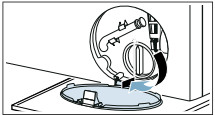
- 6. Close the service flap
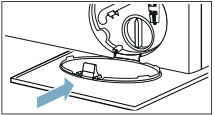
Note: To prevent unused detergent from flowing straight into the drain during the next wash: Pour 1 litre of water into dispenser II and start the Drain programme.
The drain hose at the siphon is blocked
1. Turn the programme selector to Off. Pull out the mains plug.
2. Loosen the hose clamp. Carefully remove the drain hose; residual water may leak out.
3. Clean the drain hose and siphon connecting piece.
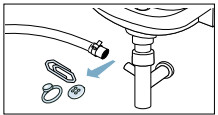
4. Re-attach the drain hose and secure the connection point using the hose clamp.
Filter in the water supply is blocked
Clean the filters:
1. Disconnect the hose from the rear of the appliance.
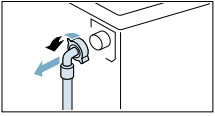
2. Use pliers to remove the filter
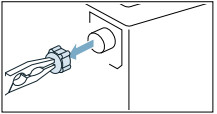
3. Clean the filter with a small brush.
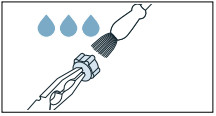
4. Connect the hose and check for leaks.
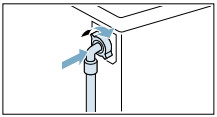
Faults and what to do about them
Emergency release
E.g. power outage or in the event of a loss of power The programme continues when the power supply is restored. However, if the laundry has to be removed, the appliance door can be opened as follows
Warning Risk of scalding! When you are washing at high temperatures, there is a risk of scalding if you come into contact with hot water and laundry. If possible, leave it to cool down first.
Warning Risk of injury! Reaching into the drum while it is still turning may cause hand injuries. Do not reach into the drum when it is turning. Wait until the drum has stopped turning.
Caution! Water damage! Any escaping water may cause water damage. Do not open the door if water can be seen through the glass.
- 1. Turn the programme selector to Off. Pull out the mains plug.
- 2. Open the service flap.
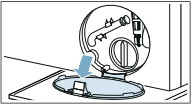
- 3. Drain the water.
 Page 41
Page 41 - 4. Pull the emergency release downwards with a tool and release. The door can then be opened.
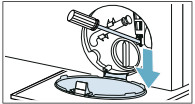
Information on the display panel
| Display | Cause/Remedy |
 |
■ Flashes fast + signal: The door was opened and the water level is too high. Close the door, continue the programme with ■ Flashes slowly: The door lock temperature is too high to open the door. Wait approx. 30 seconds until the door lock temperature cools down. |
| Hot | The temperature in the drum is too high. Wait for the appliance running to cool down the laundry till the Hot disappears on the display panel, then the door can be opened |
 |
■ Flashes (no water supply): Water tap turned on? Filter in the water supply is blocked? ■ Lights up (low water pressure): For information only. This will not affect the programme progress. The programme duration is extended. |
 lights up lights up |
The childproof lock is activated – deactivate it. |
The symbol  flashes flashes |
Run the Cottons Notes ■ Run the programme without laundry. ■ Use washing powder or a detergent containing bleach. To prevent foaming, only use half the amount of detergent recommended by the detergent manufacturer. Do not use detergent designed for woollens or delicates. ■ Switching the drum care information signal on/off. |
| E:36 alternating with -10 |
■ Drain pipe or water drain hose is blocked. Clean the drain pipe and the water outlet hose. ■ Drain pipe or water drain hose is caught or jammed. Ensure that the drain pipe and water drain hose are not kinked or trapped. ■ The drain pump is blocked. ■ The drain hose at the siphon is blocked. ■ The water drain hose is connected too high. Install the water outlet hose at a maximum height of 1 meter. |
| E:35 alternating with -10 (Suitable for special models) | There is water in the base trough, the appliance is leaking. Turn off the tap. Call customer services. |
| H:95 alternating with End when programme is finished | No water detected in drying phase, may get bad drying result.  "Filter in the water supply is blocked" on page 42 "Filter in the water supply is blocked" on page 42 |
| H:32 alternating with End when programme is finished | The unbalanced load detection system has interrupted the spin cycle because the laundry is unevenly distributed. Distribute small and large items of laundry evenly in the drum. |
| Other displays | Turn the programme selector to Off, wait for five seconds and then switch it on again. If the display appears again, call customer services. |
Faults and what to do about them
| Faults | Cause/Remedy |
| Water is leaking from the appliance |
■ Attach the drain hose correctly or replace it. ■ Tighten the screw fitting on the supply hose. |
| The door cannot be opened. |
■ - - - (Rinse hold = no final drain) is activated (depending on the module). Continue the programme by selecting ■ The temperature in drum is too high to open the door. ■ The safety function is activated. Stop the programme? ■ The water level in drum is too high. ■ Can the door only be opened by the emergency release? |
|
The appliance is not filling with water. Detergent is not being dispensed. |
■ Programme does not start? ■ Is the tap turned on? ■ Could the filter in the water supply be blocked? Note: If an additional water filter has been installed (depending on the model), check for contaminants and clean if required ■ Is the supply hose kinked or trapped? |
| The programme will not start. |
■ Have you touched the ■ Is the door closed? ■ Childproof lock activated? Deactivate childproof lock. ■ Shop mode activated? If the display shows |
| The programme has started and the drum is rotating, but the drum is not filling with water | Not a fault – Some programme specifically detect and weigh the load after the programme has started in order to calculate the optimum amount of water for washing. The drum will then start filling with water. |
| The water is not draining |
■ Drain pipe or water drain hose is blocked. Clean the drain pipe and the water drain hose. ■ Drain pipe or water drain hose is caught or jammed. Ensure that the drain pipe and the water drain hose are not kinked or trapped. ■ Could the drain pump be blocked? ■ Could the drain hose at the siphon be blocked? ■ - - - (Rinse hold = no final drain) is activated (depending on the module). Continue the programme by selecting ■ The water drain hose is connected too high. Install the water drain hose at a maximum height of 1 meter. |
| Water is not visible in the drum. | Not a fault – the water is below the visible area. |
| The wrong detergent/fabric softener has been poured into the dispenser(s). | Empty the dispenser(s), clean it/them and pour in the correct product.  "Emptying the detergent draw, cleaning the detergent drawer and its housing" on page 41 "Emptying the detergent draw, cleaning the detergent drawer and its housing" on page 41 |
| Detergent/fabric softener has congealed in the dispensers. | Empty the dispenser(s), clean it/them and pour in the correct product. |
| Foam is leaking from the detergent drawer. |
Too much detergent used? Mix 1 tablespoon of fabric softener with ½ litre of water and pour into dispenser II. (Not for outdoor, sports and down-filled textiles!) Reduce detergent dosage for the next wash cycle. Use commercially available low foam detergent and care product which are suitable for machine. |
| Repeated, intensive foaming. | Have you used too much detergent? Add less detergent in the next time you run a wash cycle with the same load |
| Detergent/fabric softener drips off the seal and collects on the door or in the seal fold. | There is too much detergent/fabric softener in the dispensers. Do not fill the dispensers above the max. mark. |
| The spin result is not satisfactory. Laundry wet/too damp. |
■ Not a fault – the unbalanced load detection system has interrupted the spin cycle because the laundry is unevenly distributed. Distribute small and large items of laundry evenly in the drum. ■ Is Easy iron additional programme setting selected (depending on the model)? ■ Is Night Wash additional programme setting or Night Wash programme selected (depending on the model)? ■ Is the selected speed too low? |
| The spin cycle runs several times. | Not a fault – the unbalanced load detection system is adjusting an imbalance. |
| The programme is taking longer than usual. |
■ Not a fault – the unbalanced load detection system is adjusting an imbalance by repeatedly distributing the laundry. ■ Not a fault – the foam detection system is activated – a rinse cycle has been switched on. |
| The length of the programme changes during the wash/dry cycle. | Not a fault – the programme sequence is optimised for the specific washing/ drying process. This may change the length of the programme shown on the display panel. |
| Odours, stain formation in the appliance. |
Run the Cottons Add washing powder or a detergent containing bleach. Note: To prevent foaming, only use half the amount of detergent recommended by the detergent manufacturer. Do not use detergents designed for woollens or delicates |
| Loud noises, vibrations and appliance "movement" during the spin cycle. |
■ Is the appliance aligned? ■ Are the appliance's feet fixed? Secure the appliance's feet. ■ Have the transport locks been removed? |
| The display panel indicator lights do not work while the appliance is running. |
■ Has there been a power failure? ■ Have the fuses blown? Reset/replace the fuses. ■ If the fault occurs repeatedly, call customer services. |
| There is detergent residue on the laundry. |
■ Some phosphate-free detergents contain water-insoluble residue. ■ Select Rinse |
| Spin during the drying phase. | This is an innovative process known as thermal spinning used to reduce energy consumption during the drying phase. It is designed like this, please wait until program finished. |
| Fluff found on the laundry. | Run the Cottons  (cold) programme without laundry and detergent to remove fluff which have accumulated inside the drum during the previous drying cycle. (cold) programme without laundry and detergent to remove fluff which have accumulated inside the drum during the previous drying cycle. |
| Water inlet noise during the drying phase. | The washer dryer uses water condensation technology, water is constantly needed to dry the laundry. Therefore the water tap must be on all the time, till the end of the drying phase. |
| Drying duration extended. |
. ■ Run the Cottons ■ If the ambient temperature is higher than 30 °C, this may extend the drying time. ■ Insufficient air circulation in the room may increase the drying time. Ventilate the room. |
| Drying programme does not start |
■ Drying additional programme setting not selected? ■ Door not closed properly? |
| Creasing. |
■ Creasing occurs when you have exceeded the maximum load or selected the wrong program for the type of fabric. All the required information can be found in the programme overview table. ■ Remove clothes immediately after drying; creasing may occur if they are left in the drum. |
| The drying result is not satisfactory (laundry is not dry enough). |
■ After the end of the programme, warm laundry feels damper than it actually is. Spread the laundry out and allow the heat to disperse. ■ Excessively high ambient temperature (above 30 °C) or inadequate ventilation in the room in which the washer dryer is situated. ■ The laundry has not been spun well enough before drying. Always set the highest selectable spin speed for the particular washing programme. ■ Washer dryer overloaded: Observe the recommendations for the maximum load in the programme table and on the load display. Do not overload the washer dryer, as the maximum load for the drying phase is less than the maximum load for the wash cycle. Unload the washer dryer after washing with the maximum load and divide the laundry into two drying cycles. ■ The power supply voltage is too low (below 200 V) – provide a suitable power supply. ■ The water pressure is low. According to water condensing principle, low water pressure will cause evaporated steam to not condense properly and completely. ■ The water tap is closed during drying. Due to the use of the water condensation technology for drying, please keep the connected water tap open during the drying process, otherwise proper drying cannot be guaranteed. ■ Thick multilayered textiles or textiles with thick fillings dry easily on the surface, but not inside. This equalisation process may take longer. |
|
If you cannot rectify a fault yourself (after turning the programme selector to Off and on again) or a repair is required: ■ Turn the programme selector to Off. Pull out the mains plug. ■ Turn off the tap and call customer services. |
|
See other models: WAS28461AU/01 SGE53B55UC SGV78B53UC SGE78B55UC WGG254A0SG

 Drain.
Drain. "Filter in the water supply is blocked" on page 42 Is the supply hose kinked or trapped?
"Filter in the water supply is blocked" on page 42 Is the supply hose kinked or trapped? 90°C programme to clean and care for the drum and the outer tub.
90°C programme to clean and care for the drum and the outer tub. Spin/Drain and pressing
Spin/Drain and pressing  for 5 s after you have switched on the appliance, the appliance is in shop mode. Wait for the display message
for 5 s after you have switched on the appliance, the appliance is in shop mode. Wait for the display message  will appear in the display panel. Turn the programme selector to Off. Now you already turned off the shop mode. You can use the appliance now as usual.
will appear in the display panel. Turn the programme selector to Off. Now you already turned off the shop mode. You can use the appliance now as usual. or brush the laundry after washing.
or brush the laundry after washing.